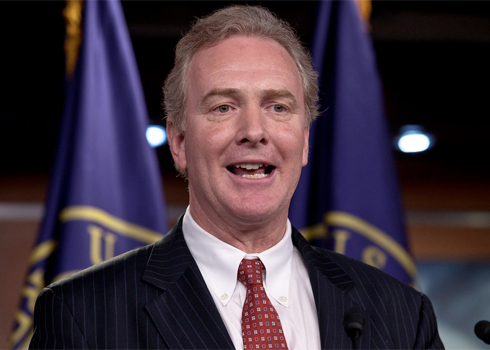Rep. Chris Van Hollen (D-MD) is taking matters into his own hands when it comes to rolling back elements of the Supreme Court’s landmark Citizen United campaign finance case and requiring disclosure of campaign donations.
Van Hollen and a group of reform advocates filed suit Thursday in federal court, as well as a petition with the Federal Election Commission, that aims to force business associations and nonprofit groups to disclose secret contributions that fueled millions of dollars in attack ads against Democrats in the 2010 midterm campaign.
The legal steps come in the wake of news that the Obama administration is circulating a draft executive order requiring federal contractors to disclose contributions made to nonprofit groups and trade associations. Although uncoordinated, the leak of the executive order and the lawsuit pack a one-two punch and demonstrate just how determined Democrats are in overturning some elements of Citizens United before the 2012 election cycle shifts into high gear.
The proposed executive order would affect thousands of contractors — many in the mammoth defense contracting world. Republicans and members of the business community immediately cried foul, arguing that the order would restrict free speech and could result in businesses being unfairly penalized for their political leanings and donations.
Reacting to news of the draft executive order, Senate Minority Leader Mitch McConnell (R-KY) issued a statement accusing Obama of playing politics with contractors, arguing that the effort is an attempt “to silence or intimidate political adversaries’ speech through the government contracting system.”
President Obama and advocates of more campaign finance transparency are trying to find ways to implement elements of the so-called Disclose Act, a bill sponsored by Van Hollen
and Sen. Chuck Schumer (D-NY) that failed to pass the Senate in 2010. That measure was designed to counter some aspects of last year’s landmark Citizens United Supreme Court decision, which allows unlimited corporate and union treasury funds to fund independent campaign ads.
McConnell vigorously opposed the Disclose Act, and it was one vote shy of reaching the 60 vote-hurdle needed to overcome a filibuster and ended up dying in the Senate last year. The bill’s backers point to the Supreme Court’s majority opinion, which explicitly supported transparency and prompt disclosure of political spending.
“With the advent of the Internet, prompt disclosure of expenditures can provide shareholders and citizens with the information needed to hold corporations and elected officials accountable,” the high court said in the opinion. “Shareholders can determine whether their corporation’s political speech advances the corporation’s interest in making profits, and citizens can see whether elected officials are “‘in the pocket’ of so-called moneyed interests.”
Without a change in the law or an executive order, nonprofit groups and trade associations are not required to make their donations public and usually don’t.
“Secret money in American politics is extremely dangerous and inevitably leads to corruption and scandal,” said Democracy 21’s Fred Wertheimer. “That was the lesson of Watergate and one we don’t want to see repeated.”
Along with Democracy 21, the group of reform advocates filing suit include lawyers from the Campaign Legal Center.
“In 2007, the FEC gutted McCain-Feingold disclosure requirements in a little-noticed rulemaking,” explained Gerry Hebert, CLC’s executive director. “The flood of corporate political spending unleashed by the Supreme Court’s 2010 ruling in Citizens United made clear the impact of 2007 FEC regulation changes as untold millions of corporate dollars were funneled through the Chamber of Commerce and other groups to avoid disclosure of the source of the funds.”
The lawsuit argues that recent FEC regulations are contrary to the law, citing language in the Bipartisan Campaign Finance Reform Act of 2002 requiring disclosure of donations of $1,000 or more if the donations were made with the goal of assisting electioneering activities.
The rule-making petition challenges an existing FEC regulation allowing nonprofit groups to pay for campaign expenditures if they are not coordinated with a party or candidate for federal office.
Republican business-backed groups created non-profit organizations, such as the Karl Rove-backed American Crossroads, which ended up spending hundreds of millions of dollars on political advertisements against Democrats.
Democrats are late to the game, but have recently formed Majority PAC, a new group aimed at electing Democrats to the Senate, and American Bridge 21st Century, which will serve as a research hub. Both plan to operate as super political action committees that can raise unlimited amounts of money from contributors whose donations must be disclosed, but they will also have affiliations with nonprofit social welfare groups that can raise money from undisclosed donors and then channel it to these super PACs.









